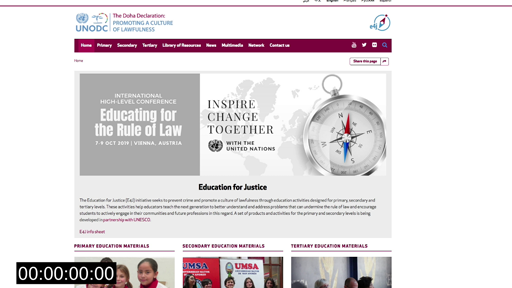Use 'Print preview' to check the number of pages and printer settings.
Print functionality varies between browsers.
Printable page generated Thursday, 19 February 2026, 5:42 PM
Unit 7: Module adaption and delivery
Unit 7: Module adaption and delivery
The University Modules on Anti-Corruption, Integrity and Ethics have deliberately been designed to be adapted to your particular teaching context so you are able to design and deliver sessions that will engage your students.
Each Module provides an outline for a three-hour class but can be used for shorter or longer sessions. The following sections provide examples of the kind of adaptation that can take place. It is not an exhaustive list and can be expanded where required.
To be able to support lecturers even further, UNODC would appreciate receiving any adapted versions of the E4J Modules (messages should be sent to unodc-e4j@un.org and e4j.ethics@un.org). UNODC will then share these with its network lecturers as examples of how the Modules can be adapted to different regions, contexts and disciplines.
You can join the network by clicking on the network tab on the E4J website or sending a request to e4j.ethics@un.org.
Adapting modules for a local context
Lecturers around the world are already adapting the E4J Integrity and Ethics Modules for use in their own contexts.Here are three examples from lecturers teaching in Nigeria and South Africa.
Gender dimensions of Ethics – Module 9 – Nigeria
To understand the impact that using these E4J Modules can have on a wider scale take a moment to watch this short summary video

Transcript
7.1 Integration with existing courses or using as a standalone programme
All the E4J Modules have been designed in a way that they could either be offered as a stand-alone Module or integrated within an existing course. As mentioned before, the modular structure allows you to select only those that are relevant within a specific context. You may also create a complete course on anti-corruption, integrity and ethics by using all 14 E4J Ethics Modules and all 14 E4J Anti-Corruption Modules, or mix and match with the E4J Modules on Crime Prevention & Criminal Justice for example.
As a stand-alone programme, the E4J anti-corruption, integrity and ethics material could be offered as either a voluntary or mandatory addition to a course, e.g. as a workshop offered outside the normal scheduled sessions. It could also be offered as part of summer or interim sessions or as public sessions with broader participation than simply the registered students.
Integration within an existing course requires advanced planning, because a specific session would have to be scheduled in a course outline, which may have to go through internal approval processes. You probably have substantial flexibility to introduce new, but related, content in a course outline.
For example, in a media and communications studies course there is likely to be an existing focus on ethics and possibly corruption awareness. In such a case, you can either replace the existing content with the E4J Module or adapt/merge the existing content with the E4J content. If there is no existing ethics content, you will have to rearrange the current content to create space in the course outline for the E4J material.
It remains your responsibility to familiarize yourself with the academic requirements of your specific institution. The process described above might not always be possible. Below is an example of how E4J Ethics Module 1 could be adapted as a stand-alone course.
| Session | Topic | Brief description |
|---|---|---|
| 1 | Introduction | Dealing with ethical dilemmas and introducing the concept of integrity |
| 2 | Substantive versus meta-ethics | Distinction between substantive and meta-ethics |
| 3 | Cultural relativism | Dealing with the issue of different cultures and different moral codes |
| 4 | Subjectivism and egoism | Subjectivism, emotivism and reason |
| 5 | Social contract theory | Hobbes, the prisoner’s dilemma |
| 6 | Utilitarianism | Overview of theory and main philosophers, with examples of application to specific cases |
| 7 | Deontology | Overview of theory and main philosophers, with examples of application to specific cases |
| 8 | Virtue ethics | Overview of theory and main philosophers, with examples of application to specific cases |
7.2 Localizing the content and adapting time frames
You can take the following steps to localize the content:
Determine if there is any content that might be deemed offensive in a local cultural context and remove or adapt that part
Provide a customized introduction that refers to relevant legal frameworks and case studies, perhaps recent examples that appeared in the local media
If required, replace or complement the existing readings, case studies and exercises with examples that reflect the local context
If appropriate, merge the E4J content with an existing Module
If required, translate the content into a local language
Adapt content to better relate to a certain discipline, sector or industry.
The three-hour time slot is offered as a guideline. Depending on your lecturing style and the class size, a typical E4J Module, with all exercises, could probably be offered in a timeframe that ranges between one and four hours. These requirements vary between institutions and programmes.
Undergraduate contact sessions are usually shorter, and one E4J Module might have to be spread over two or more sessions. By contrast, postgraduate sessions could last two or three hours, which might be sufficient to cover the content of an entire Module.
However, you may still wish to spread the Module over two sessions, as the break in between the two sessions could allow students to process and internalize the materials better. In some cases, you might wish to introduce additional content to offer a half-day or even a full-day workshop.
There are no rigid guidelines in this regard and you need to make adjustments to fit your circumstances. Given their highly interactive nature, the exercises in the Modules are most appropriate for relatively small classes of up to 50 students, where students can be easily organized into small groups in which they discuss cases or conduct activities before group representatives provide feedback to the entire class.
In larger classes comprising a few hundred students, it is more challenging to have the same small group structure and you might wish to adapt the facilitation techniques to ensure sufficient time for group discussions as well as providing feedback to the entire class.
The easiest way to deal with the requirement for small group discussion in a large class is to ask students to discuss the issues with the four or five students sitting close to them. Given time limitations, not all groups will be able to provide feedback in each exercise.
It is recommended that you try to ensure that all groups get the opportunity to provide feedback at least once during the session. If time permits, you could facilitate a discussion in plenary after each group has provided feedback.
7.3 Making the most of the E4J resources
The E4J Modules are the product of an international collaboration of 600 academics from over 500 Universities drawn from all over the world. They have worked hard to provide what we think is a valuable resource to support you in your teaching.
In particular, they have included a number of specific features that aim to make it easier for you to adapt the material to your teaching context. The following infographic highlights some of the features of the Module design that you may find particularly helpful.
Figure 15 The E4J Module components
The E4J Anti-Corruption, Integrity and Ethics Modules are part of a wider set of resources that make up the E4J initiative. Depending on your teaching context, you may find it useful to combine elements of the Integrity and Ethics materials with resources from other topic areas. So it is well worth spending some time familiarising yourself with the E4J website.
This web tour provides a useful summary of some of the key things to look out for.

Transcript
7.4 Conclusion and Module overview
In this unit you have explored how the E4J Anti-Corruption, Integrity, Ethics Modules have deliberately been designed to be adapted to fit your particular teaching context and engage your students.
You have explored how you can contextualise the materials and integrate the integrity and ethics content with other course material available on the E4J website and considered how you can benefit from the global E4J network.
The E4J Integrity and Ethics Modules
The interactive below gives you a summary of the 14 E4J Integrity and Ethics Modules. Clicking on each circle gives you a direct link to the Introduction and learning outcomes page of the corresponding Module website.
Please note: the Module links open in a new tab and your E4J course tab remains open in your browser.
Figure 16 Links to the E4J Integrity and Ethics Modules
The E4J Anti-Corruption Modules
The interactive below gives you a summary of the 13 E4J Anti-Corruption Modules. Clicking on each circle gives you a direct link to the Introduction and learning outcomes page of the corresponding Module website.
Please note: only Modules 1–6 are currently available. The other Modules will be added as they are published by UNODC.
Figure 17 Links to the E4J Anti-Corruption Modules
Go to Course conclusion and further reading now.